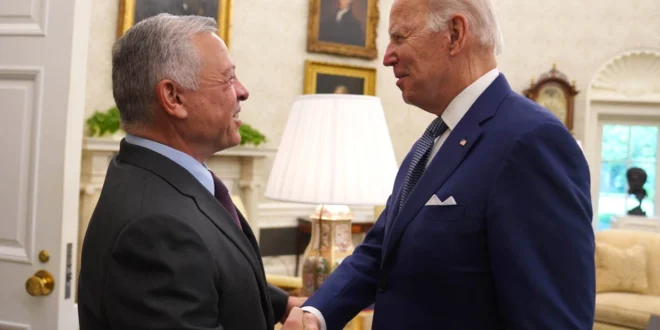Dr. Shehab Al Makahleh
The upcoming meeting between King Abdullah II of Jordan and President Joe Biden is not merely a diplomatic visit; it holds the weight of a nation’s plea for peace and stability. Amidst the chaos and devastation of the Israeli war in the Gaza Strip, Jordan emerges as a pivotal peace broker in the decades-long Israeli-Palestinian conflict. As the first Arab head of state to set foot in the White House since the United States supported Israel’s actions, King Abdullah’s visit symbolizes the indispensable role that Jordan plays in this crisis.
A Call for Ceasefire:
Jordan’s primary objective during King Abdullah’s visit is to advocate for an immediate ceasefire between Israel and Hamas. The consequences of prolonged conflict are dire, with health officials reporting over 28,000 lives lost and double that number wounded. The prospect of Israel’s advance on Rafah, a city where half of Gaza’s population resides, poses an imminent threat to the lives of countless innocents. Jordan fears further regional instability and the burden of an influx of Palestinian refugees on its doorstep. King Abdullah, known for his close ties with American presidents, views this meeting with President Biden as a last-ditch effort to secure Western allies’ attention and intervention.
Domestic Pressure and Strained US-Jordan Relations:
Despite their historically close relations, the United States and Jordan have faced increasing scrutiny within the Hashemite kingdom. Many Jordanians perceive the US as an enabler of Israel’s war in Gaza, leading to mass protests and calls for the abandonment of peace treaties and defense agreements. This sentiment was evident when Jordan canceled a summit with Biden, Egypt, and the Palestinian Authority due to the deadly blast at a Gaza hospital. However, it is crucial to recognize that there exists a divergence of opinion between the public and the monarchy. While the anger among the Jordanian people is palpable, the government and the monarchy view the US military presence on their borders as essential for the country’s security.
The Quest for a Durable Peace:
During the meeting, King Abdullah and President Biden will delve into efforts to achieve a lasting end to the crisis. The Biden administration’s proposed plan involves a pause in fighting to secure the release of hostages held by Hamas, paving the way for a broader diplomatic agreement to permanently end the war. This strategy also emphasizes linking normalization between Israel and Saudi Arabia to the establishment of a future Palestinian state. Jordan seeks a comprehensive solution that addresses Gaza, the West Bank, and East Jerusalem, considering the conflict an existential issue that is central to its foreign policy.
The Humanitarian Crisis and Displacement:
Jordan’s concerns extend beyond geopolitical implications. The ongoing Israeli campaign in Gaza has evoked fears of a second Nakba, referring to the expulsion of Palestinians from their homes in 1948. The country worries about the destabilizing impact of Israeli settler violence on the neighboring West Bank and the potential for more refugee spillover. Hosting over 2 million Palestinian refugees, Jordan already bears the largest burden globally. The king will urge the Biden administration to resume funding for the UN’s Palestinian refugee agency, which faces closure due to international funding cuts. Forced displacement is a pressing issue within Jordan itself, with over half of its population having Palestinian roots.
The Role of Social Media and Political Implications:
As the conflict unfolds, social media has become a platform for the world to witness the devastation in real-time. Jordan, like its Arab neighbors, is concerned about the radicalization of its youth, who are exposed to the horrors of war through these channels. Polling reveals a significant increase in support for Hamas among Jordanians, further highlighting the urgency of resolving the Gaza crisis. The impending parliamentary elections in August also raise concerns about the empowerment of Islamist groups, including the Muslim Brotherhood’s Islamic Action Front party.
Jordan’s King Abdullah II arrives at the White House with a weighty responsibility on his shoulders. Beyond a diplomatic visit, his presence signifies Jordan’s vital role as a peace broker in the Israeli-Palestinian conflict. The urgency for an immediate ceasefire cannot be overstated as lives are lost, and the region’s stability hangs in the balance. It is essential for the United States and other Western allies to recognize Jordan’s plea for intervention and work towards a durable peace that guarantees the security of Israel while addressing the legitimate aspirations of the Palestinian people. The time for action is now

 Geostrategic Media Political Commentary, Analysis, Security, Defense
Geostrategic Media Political Commentary, Analysis, Security, Defense




